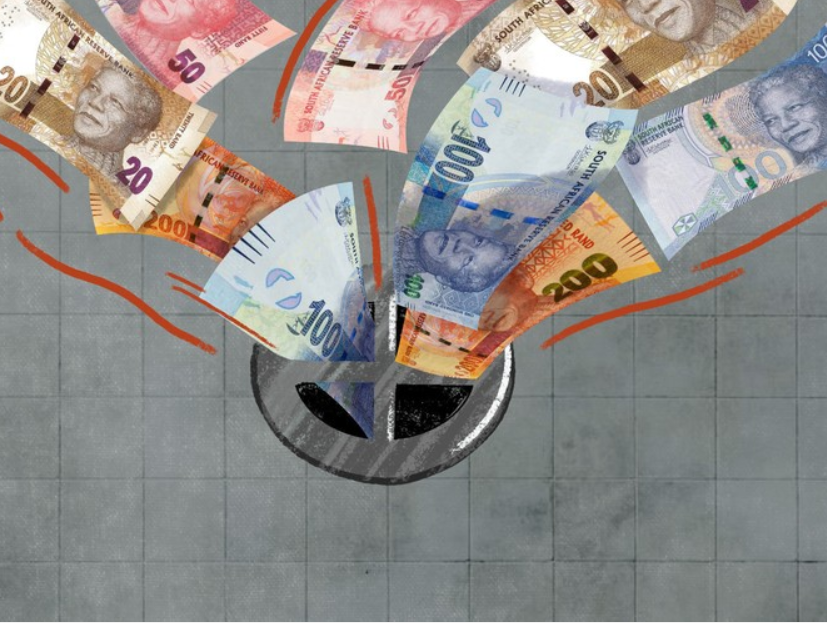Banxso’s bank accounts have been frozen and people who used the platform are likely to lose their money. Illustration: Lisa Nelson
By Tori Newby
- A pensioner may have lost R1-million of his savings on financial company Banxso’s platform.
- The Financial Sector Conduct Authority (FSCA) suspended Banxso’s licence on 16 October and froze its bank accounts.
- The pensioner says he was enticed to invest by deepfake adverts, which the FSCA has since issued a warning against.
- Banxso denies any wrongdoing.
Pensioner Norman (name changed) deposited hundreds of thousands of rand with an investment platform called Banxso. But Norman is worried he may never get his money back, after the Financial Sector Conduct Authority (FSCA) “provisionally withdrew” the company’s licence on 16 October, following months of complaints by investors against Banxso.
Norman saw an advertisement earlier this year for the investment platform, and signed up to invest. One of Banxso’s brokers contacted Norman and advised him to make an initial deposit of several thousand rand despite him having no trading experience.
Banxso, which describes itself as “not your grandfather’s bank”, offers access to forex, stocks, indices, cryptocurrencies and commodities. One product it offers is a “contract for difference” (CFD), which is an agreement between a buyer and a seller in terms of which the buyer will pay the seller the difference between the current value of an asset and its value when the contract was started. This is a way to invest in the movement of an asset (a share, for instance) without actually owning the asset.
But CFDs are considered very risky investments and investors can lose all their money very quickly. CFD trading is banned in the United States.
Banxso chief operating officer Manuel de Andrade confirmed that trading CFDs “requires skills, knowledge, and understanding of relevant risks and is not suitable for everyone”.
“Leveraged trading activity involves substantial risk of losing all invested funds within a short time period,” he said in response to questions from GroundUp. “Banxso is not responsible for client trading losses,” he said.
After his initial investment, the Banxso broker and Norman developed a relationship, with the broker calling and messaging him several times a week to update about the markets and advise Norman to deposit more money.
The broker had finally worn Norman down, one of his relatives said.
Norman continued to deposit more money over several months. When he eventually asked to withdraw his money, he was told the markets were down and he should keep investing instead, to avoid forfeiting his money.
The brokers used global crises as a persuasive tactic, advertising “huge trading opportunities” after missile launches in Iran, for example.
In the brokers’ messages, monetary values were sometimes listed in rand and sometimes in US dollars.
In total, Norman deposited over R1-million. In early October, Norman decided to finally cut ties, and he notified Banxso that he would escalate the matter if they did not return his funds within seven days.
Norman was asked to supply FICA documents (which are legally required to verify a person’s identity and are usually required before a deposit is made).
He did so and was offered a settlement, of tens of thousands of US dollars.
He was instructed to log back into the Banxso site to withdraw these funds. But by then the FSCA had provisionally withdrawn Banxso’s licence and ordered the freezing of Banxo’s bank accounts.
Last December, the FSCA issued a public warning against Immediate Matrix, a company which displayed advertisements on TV for Banxso, after complaints of deepfake advertisements for Banxso, such as the one which enticed Norman. These deepfakes are digitally-altered images of famous people, such as Elon Musk, used without their consent.
Two days after the warning, on 21 December, Banxso director Frederick Watkins resigned.
Banxso directors Warwick David Sneider and Harel Adam Sekler are also directors of Vanwealth Portfolio Management. Six other Vanwealth directors resigned two days after the FSCA’s warning against Immediate Matrix.
Sneider also directs dozens of additional trading and investment platforms, including Afrimarkets Capital alongside Sekler. Two of Afrimarkets Capital’s directors, Sebatane Mankgoke Raphela and Paul Hwingwiri, also resigned on 21 December.
Lawyers representing Banxso and Afrimarkets have denied the use of fraudulent advertising, and have stated that Banxso and Afrimarkets Capital are wholly independent of each other.
But in the 16 October announcement stating that Banxso’s licence is suspended, the FSCA said there is a “possible association” between Banxso and the Immediate Matrix advertisements.
However in a statement that day, Banxso again denied any use of deepfake advertisements, or any financial misappropriation or maladministration of client accounts. The company said it was committed to the “transparency and regulatory compliance across all of its operations” and was co-operating fully with the FSCA investigation.
Banxso director James Preston Hickman resigned the same day.
De Andrade said all Banxso’s bank accounts had been frozen, “hence no withdrawal requests or client refunds may be executed at this point”. Banxso was taking “all steps within its power” to protect clients, he said, and the matter is being challenged in the High Court.
Norman is still hoping he’ll get his money back.
Follow African Insider on Facebook, Twitter and Instagram
Picture: GroundUp
For more African news, visit Africaninsider.com


